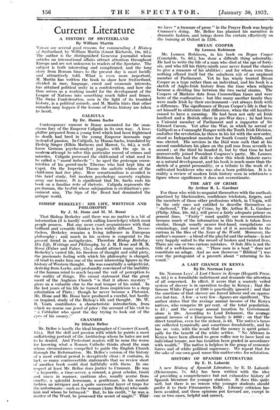CALIGULA By Dr. Harms Sachs
Contemporary rumour in Rome accounted for the mon- strous fury of the Emperor Caligula in its own way. A love- philtre prepared from a young fowl which had been frightened to death had bred in the young Emperor insensate rage instead of passion. In Caligula, by Hanns Sachs, translated by Hedvig Singer (Elkin Mathews and Marrot, 7s. 6d.), a well- know German psycho-analyst juggles with the ego in a moderns attempt to solve this particular record of crimes and miseries. Caligula possessed the child-mind of what used to be called a " moral imbecile " : he aped the grotesque eccen- tricities of his grand-uncle Tiberius who had kept him at Capri. On the Imperial Throne the sadistic whims of the child-man had free play. Mere sensationalism is avoided in his brief study, but modern psychology scarcely explains away our horror. It is significant that Dr. Sachs ends his book on a familiar note of rhetoric. Caligula represents the pre-human, the bestial whose subjugation is civilization's pre- eminent aim. The Sign of the Beast had dominated the antique world.




































 Previous page
Previous page